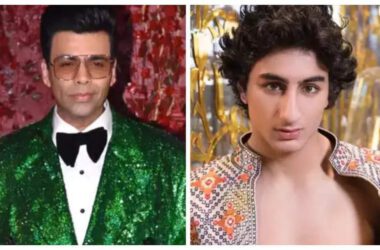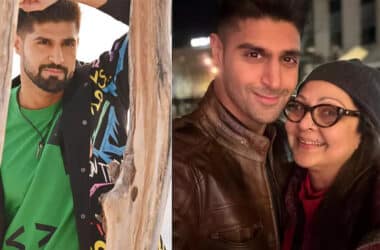[ad_1]
Last Thanksgiving I was seated at the head of the dining room table with my family gathered around, enjoying our traditional feast: turkey, potatoes, cranberry sauce, gravy and a mashed-yams-with-mini-marshmallows concoction we affectionately call “glop.”
My sons, 18 and 20, piled their plates high. My mother worked her way through smaller portions and a glass of wine. And I held the hand of my love, who was seated next to me with tears in her eyes as she looked across the table at a woman, her contemporary, who was eating with the help of a caregiver.
That woman is my wife, Bridget, aged 59.
Before Alzheimer’s devoured Bridget’s neurons along with her essence, Thanksgiving was her favorite holiday. Now, a decade into the disease, my wife had no idea what Thanksgiving was or who we were. The caregiver had to keep reminding her to stay seated. That evening was also the first time she and my new partner ate at the same table.
None of us could have imagined this scenario until recently. For a decade, my wife and I were happily married and parenting, until her executive functioning skills started to falter. Bridget — who expertly organized both our wedding and the budgets of the Museum of Modern Art and the Whitney Museum on Excel spreadsheets — refused to believe it was anything serious until the mistakes became too frequent and dangerous to ignore: running stop signs, burning pots, missing play dates, forgetting to show up for her own 50th birthday dinner.
After the neurologist delivered the devastating news, eight years ago, that Bridget had early onset Alzheimer’s, I cared for her at home with the help of caregivers while continuing to work full-time and parent our sons, then 11 and 13.
Eventually, Bridget required round-the-clock care at home. Forced from our bedroom by her incessant agitation, I created a separate space in our home for me to sleep and live in.
“Please go find someone else,” she urged me shortly after her diagnosis.
But I dismissed the idea out of hand. I didn’t want to imagine life without her. But six years later, Bridget no longer knew me as her husband. We had never had a serious discussion about it, and now she no longer could.
I missed Bridget and was lonely. But rather than wading into the murky waters of what type of companionship could exist within the context of my marriage, I had simply convinced myself I didn’t need a partner. Besides, what woman would ever accept a relationship with a man who was committed to remaining married and caring for his wife?
Deb, the woman whose hand I was holding at Thanksgiving, was married for 25 years before divorcing in 2018. Her three children, the youngest of whom is 17, were celebrating with their father a few miles away; she and her ex take turns hosting the holiday. I met her 14 months earlier on a surf outing in Montauk in the wake of Hurricane Fiona. She had driven to the beach that morning after a mutual friend had suggested we meet, concerned that we both lacked companionship.
The waves were big that day; the ocean cold. It took me a while to work up the courage to dive in, but eventually I threw on a wet suit and caught the best wave I’d had all season. By contrast, the thought of plunging into the search for a partner again felt insurmountable because of the guilt I was sure I would feel.
During that first meeting on the beach, I said to Deb, “I’m OK not ever marrying again and getting different things from different people.”
“Mm hmm,” she said, seemingly skeptical.
With dating off limits, she and I met up for more beach outings, bike rides, a play and a movie. By then, we had each been through a lot in life, but our focus was on what the miraculous present had to offer. “One of these days we are going to have only an OK time together,” I said after about the third or fourth non-date.
After several months, I began asking myself: “What exactly am I waiting for?” If it didn’t work out for whatever reason, I would be back to square one: married but effectively alone.
One Friday night, I surprised Deb with a kiss, and suddenly my life took on a new dimension. Our romance did so many things at once: helped me regain hope, process loss, rediscover wonder, and remember what it was like to be in a reciprocal relationship. The first time she made me dinner, I practically fell off my chair with gratitude.
Deb has turned out to be an incredibly capable and understanding partner. She doesn’t question the time I spend with my wife and children. I still care for my wife as before, and I keep my wedding ring on. I am immeasurably happier. I can love two people fully and not feel conflicted.
Deb and I were open about our relationship with our family and friends. There were complications, of course. Deb had two children living with her who were understandably reluctant to accept me until the relationship proved serious. I had a high school senior and my wife at home. But we all adjusted.
My children seemed grateful to have a woman in their lives who understood the advantages of a mattress topper on a college bed. When Deb got in a serious car accident, her sons and I descended on the emergency room, cracking jokes to keep up her spirits and eating takeout hamburgers on the hospital floor. My parents-in-law gave us their blessing, with my wife’s mother saying, “It’s about time.”
I even tried to explain to Bridget that I had found another partner, but I would always care for her at home.
“I think that’s a good idea,” she said, but I’m not sure how much she understood.
At Thanksgiving, holding Deb’s hand, I thought I knew why she was in tears. She had just watched my older son greet his mother by saying, “It’s me, William.”
Bridget did not react at first. She did return his hug, albeit clumsily, after an excruciatingly long pause. I had seen similar scenes dozens of times, and I’d told Deb about them, but she had never witnessed Bridget failing to respond to her own child.
Deb expressed her empathy for Bridget during one of our first nights together. “It’s so unfair that someone had to get sick in order for me to be with you,” she said. Since then, the two had met several times and attended events with me, including an Alzheimer’s fund-raising walk and a photo shoot before my son’s graduation from high school — yet another milestone for which Bridget was present yet absent. Deb, whom I would describe as emotionally intrepid, had handled all these occasions with generosity and grace.
But I underestimated the emotional impact of seating them at the same Thanksgiving table. After we finished the meal and cleaned up, Deb drove me back to the apartment we now share.
“I can’t help but feel like an interloper,” she said. “This is her holiday in her home, and I’m taking her place, but she’s still here. I know it’s irrational, but I can’t help thinking she must feel that displacement.”
“I don’t think she feels that,” I said. “Please don’t feel guilty.”
“I think it’s more loaded because it’s Thanksgiving,” she said. “It’s family time.”
“You’re part of my family now.”
“I know, but I still feel what I feel.”
Eventually I stopped trying to talk her out of her feelings and said, “I guess I’d be worried if you didn’t feel this way.”
We brushed our teeth and got into bed together.
“I know why we can’t be married,” she said. “And I accept that this is our reality. But it’s still hard in some unnamable way I feel bad even mentioning.”
“I feel as if I am marrying you every day with what we do for each other,” I said.
As usual, without much planning, we had prepared and served the meal — our first Thanksgiving together — at my family home with ease, almost wordlessly. Deb had even taken it upon herself to get the family recipe for the “glop” from my mother-in-law, who could not make it this year because of her own husband’s illness. (“Your father is dying of cancer,” I had tried explaining to Bridget, to no avail.)
It was the same dance Deb and I have been doing since that walk on the beach. “The Beautiful Now” is our shorthand for this dance, a daily affirmation of our commitment to each other in which pain, comfort and joy intertwine. On that night, I saw no reason to do anything but embrace it all.
Source link











